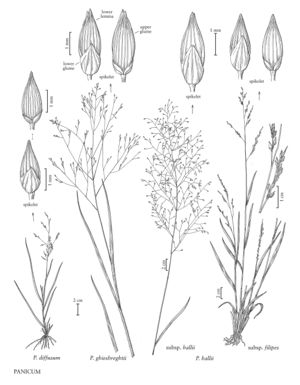familyPoaceae
subfamilyPoaceae subfam. Panicoideae
genusPanicum
subgenusPanicum subg. Panicum
sectionPanicum sect. Panicum
speciesPanicum hallii
subspeciesPanicum hallii subsp. filipes
Difference between revisions of "Panicum hallii subsp. filipes"
Synonyms: Panicum filipes
Treatment appears in FNA Volume 25. Treatment on page 467.
FNA>Volume Importer |
imported>Volume Importer |
||
| (5 intermediate revisions by 2 users not shown) | |||
| Line 6: | Line 6: | ||
|synonyms={{Treatment/ID/Synonym | |synonyms={{Treatment/ID/Synonym | ||
|name=Panicum filipes | |name=Panicum filipes | ||
| − | |authority= | + | |authority= |
| + | |rank=species | ||
}} | }} | ||
|hierarchy=Poaceae;Poaceae subfam. Panicoideae;Poaceae tribe Paniceae;Panicum;Panicum subg. Panicum;Panicum sect. Panicum;Panicum hallii;Panicum hallii subsp. filipes | |hierarchy=Poaceae;Poaceae subfam. Panicoideae;Poaceae tribe Paniceae;Panicum;Panicum subg. Panicum;Panicum sect. Panicum;Panicum hallii;Panicum hallii subsp. filipes | ||
| Line 15: | Line 16: | ||
}}<!-- | }}<!-- | ||
| − | --><span class="statement" id="st-undefined" data-properties=""><b>Plants </b>often taller than < | + | --><span class="statement" id="st-undefined" data-properties=""><b>Plants </b>often taller than <i></i>subsp.<i> hallii</i>, sparsely pubescent to almost glabrous. <b>Blades</b> relatively lax, ascending to spreading, not strongly clustered basally or curling at maturity. <b>Panicles</b> scarcely exceeding the blades, with more closely spaced spikelets than in <i></i>subsp.<i> hallii</i>; main branches rarely whorled, more crowded. <b>Spikelets</b> 2.1-3 mm.</span><!-- |
-->{{Treatment/Body | -->{{Treatment/Body | ||
| Line 27: | Line 28: | ||
-->{{#Taxon: | -->{{#Taxon: | ||
name=Panicum hallii subsp. filipes | name=Panicum hallii subsp. filipes | ||
| − | |||
|authority=(Scribn.) Freckmann & Lelong | |authority=(Scribn.) Freckmann & Lelong | ||
|rank=subspecies | |rank=subspecies | ||
| Line 34: | Line 34: | ||
|basionyms= | |basionyms= | ||
|family=Poaceae | |family=Poaceae | ||
| + | |illustrator=Linda A. Vorobik;Cindy Roché | ||
| + | |illustration copyright=Utah State University | ||
|reference=None | |reference=None | ||
|publication title= | |publication title= | ||
|publication year= | |publication year= | ||
|special status= | |special status= | ||
| − | |source xml=https:// | + | |source xml=https://bitbucket.org/aafc-mbb/fna-data-curation/src/200273ad09963decb8fc72550212de541d86569d/coarse_grained_fna_xml/V25/V25_1251.xml |
|subfamily=Poaceae subfam. Panicoideae | |subfamily=Poaceae subfam. Panicoideae | ||
|tribe=Poaceae tribe Paniceae | |tribe=Poaceae tribe Paniceae | ||
Latest revision as of 17:56, 11 May 2021
Plants often taller than subsp. hallii, sparsely pubescent to almost glabrous. Blades relatively lax, ascending to spreading, not strongly clustered basally or curling at maturity. Panicles scarcely exceeding the blades, with more closely spaced spikelets than in subsp. hallii; main branches rarely whorled, more crowded. Spikelets 2.1-3 mm.
Discussion
Panicum hallii subsp. filipes often grows in moist soil. Its range extends from Arizona, Texas, and Louisiana to southern Mexico.
Selected References
None.
Lower Taxa
None.
... more about "Panicum hallii subsp. filipes"
